|
|
|
Sort Order |
|
|
|
Items / Page
|
|
|
|
|
|
|
| Srl | Item |
| 1 |
ID:
132143
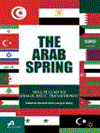

|
|
|
|
|
| Publication |
New York, Palgrave Macmillan, 2012.
|
| Description |
317p.Pbk
|
| Standard Number |
9781137344038
|
|
|
|
|
|
|
|
|
|
|
|
Copies: C:1/I:0,R:0,Q:0
Circulation
| Accession# | Call# | Current Location | Status | Policy | Location |
| 057828 | 320/HEN 057828 | Main | On Shelf | General | |
|
|
|
|
| 2 |
ID:
142505
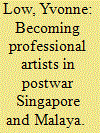

|
|
|
|
|
| Summary/Abstract |
This article aims to recover the background to the post-Second World War growth of local art activities, art education and the rise of the professional artist on the island of Singapore and peninsular Malaya. It examines how the transitional period spanning the dissolution of British colonialism and the establishment of two independent nations stimulated unique conditions for the development of local art education and created an amateur–professional artist divide. The promotion and support of fine arts and related activities were in tandem with nation-building strategies that sought to construct a common ‘Malayan’ culture and identity.
|
|
|
|
|
|
|
|
|
|
|
|
|
|
|
|
| 3 |
ID:
114823
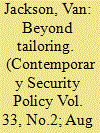

|
|
|
|
|
| Publication |
2012.
|
| Summary/Abstract |
How can one state maintain deterrence against another state undergoing an uncertain political transition? A debate within fourth wave deterrence theory focuses on whether and when a tailored approach, based on cultural, organizational, and idiosyncratic characteristics of a target state, has the greatest value. Tailored deterrence may not be appropriate under conditions of domestic political uncertainty in the target state, often those most in need of deterring. A more promising alternative for a defending state may be deterrence management. Deterrence management compensates for insufficient or low-confidence assessments of a target's values, organizational structure, power distribution, or cultural idiosyncrasies that prevent employment of tailored deterrence strategies intended to manipulate such factors. To make this case, I combine insights from deterrence theory with an exploration of the uncertain politics of a post-Kim Jong-il North Korea and the unpredictable process of power consolidation. Deterrence management may be applicable in cases of imperceptible leadership transitions in other target states. While no panacea, the deterrence management approach reinforces stability while remaining flexible enough to accommodate change.
|
|
|
|
|
|
|
|
|
|
|
|
|
|
|
|
| 4 |
ID:
145546
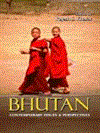

|
|
|
|
|
| Publication |
New Delhi, Adroit Publishers, 2016.
|
| Description |
xvii, 377p.: table, figurehbk
|
| Standard Number |
9788187393085
|
|
|
|
|
|
|
|
|
|
|
|
Copies: C:1/I:0,R:0,Q:0
Circulation
| Accession# | Call# | Current Location | Status | Policy | Location |
| 058694 | 954.5498/KHA 058694 | Main | On Shelf | General | |
|
|
|
|
| 5 |
ID:
120282
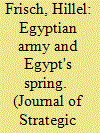

|
|
|
|
|
| Publication |
2013.
|
| Summary/Abstract |
After Mubarak's ouster, the Egyptian senior command had assumed a guardian role similar to the former Turkish model despite a shoddy performance in maintaining public order and the questionable loyalty of the lower ranked officers and the ordinary soldiers. Its relative success in managing the transition was due to the willingness of the Muslim Brotherhood and the Salafists to negotiate as stakeholders in the system rather than to battle in the streets against the Army. The Muslim Brotherhood strategy worked. In August 2012, recently elected president Morsi subordinated the military by removing the veteran Minister of Defence, the Chief-of-Staff, and other key officers. The military caved in without a whimper.
|
|
|
|
|
|
|
|
|
|
|
|
|
|
|
|
| 6 |
ID:
120294
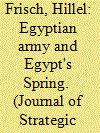

|
|
|
|
|
| Publication |
2013.
|
| Summary/Abstract |
After Mubarak's ouster, the Egyptian senior command had assumed a guardian role similar to the former Turkish model despite a shoddy performance in maintaining public order and the questionable loyalty of the lower ranked officers and the ordinary soldiers. Its relative success in managing the transition was due to the willingness of the Muslim Brotherhood and the Salafists to negotiate as stakeholders in the system rather than to battle in the streets against the Army. The Muslim Brotherhood's strategy worked. In August 2012, recently elected President Morsi subordinated the military by removing the veteran Minister of Defense, the Chief-of-Staff, and other key officers. The military caved in without a whimper.
|
|
|
|
|
|
|
|
|
|
|
|
|
|
|
|
| 7 |
ID:
047013
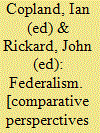

|
|
|
|
|
| Publication |
New Delhi, Manohar Publishersand Distributors, 1999.
|
| Description |
299p.
|
| Standard Number |
817304239X
|
|
|
|
|
|
|
|
|
|
|
|
Copies: C:1/I:0,R:0,Q:0
Circulation
| Accession# | Call# | Current Location | Status | Policy | Location |
| 044511 | 321.02/COP 044511 | Main | On Shelf | General | |
|
|
|
|
| 8 |
ID:
086836
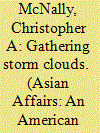

|
|
|
|
|
| Publication |
2009.
|
| Summary/Abstract |
In this article, the author puts China's recent economic boom and its possible consequences into broader perspective, arguing that China is experiencing a form of capitalist development that contains dynamics broadly similar to those experienced by earlier capitalist developers, including Bismarck's Germany and Meiji Japan. As a result, China's economy has been transformed and now possesses global influence. However, the period of slower growth currently setting in will expose fault lines in China's capitalist juggernaut. Immediate economic threats will combine with challenges emanating from China's internal political transition to create a period of economic and political uncertainty.
|
|
|
|
|
|
|
|
|
|
|
|
|
|
|
|
| 9 |
ID:
121577
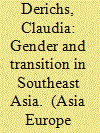

|
|
|
|
|
| Publication |
2013.
|
| Summary/Abstract |
Theories and concepts of political transition have been influenced to a great deal by Western theoretical and conceptual reflection. The parameters of transition are usually based on two assumptions or expectations: The goal of transition is democracy or a democratic system, and both actors and affected persons are perceived as gender-neutral beings, i.e., there is no distinction made between male or female actors and persons concerned. This article problematizes the conventional concept of transition and attempts a gendered conceptualization. Empirically, it draws from studies and fieldwork during the periods of political transition in Indonesia (mostly accomplished) and Malaysia (ongoing). It addresses the impacts of transition on women in particular. The core argument is that conceptual reflections of transition need to integrate a gender-sensitive perspective, but at the same time attend to the fact that "women" is not an exhausting analytical category. As illustrated by the examples of Indonesia and Malaysia, a gender-sensitive approach thus requires to also take the pluralism and heterogeneity of "women" (as well as "men") into account.
|
|
|
|
|
|
|
|
|
|
|
|
|
|
|
|
| 10 |
ID:
124775
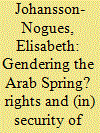

|
|
|
|
|
| Publication |
2013.
|
| Summary/Abstract |
During the anti-regime uprisings in Tunisia, Egypt and Libya, women from all walks of life were as ready as men to take to the streets to protest against the ineptitude and transgressions of their countries' governments. Their courage was particularly noteworthy given that they suffered not only the violence of the regimes' attempts to suppress protests by force, as did their male counterparts, but also a systematic targeting by security forces who attempted to break the women's spirits through attacks on their honour and bodily integrity. The female presence and agency in the Arab Spring encouraged activists in Tunisia, Egypt and Libya to expect an equitable role for women in the political transition processes that followed the fall of the authoritarian regimes in those countries. However, the female input in those political transitions has been scant. Moreover, in all three countries, established women's rights are increasingly under attack and violence against women is on the rise. This article applies a gendered perspective to explore the upheavals of the Arab Spring and the political transitions in the three countries, and inquires into the insecurities that women have suffered since early 2011.
|
|
|
|
|
|
|
|
|
|
|
|
|
|
|
|
| 11 |
ID:
116336
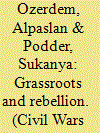

|
|
|
|
|
| Publication |
2012.
|
| Summary/Abstract |
An important aspect in the resolution of civil conflict pertains to the political transition of rebel groups, dissipation of their command structures and reintegration of former combatants. In this paper, we draw on empirical data collected in select communities of Lanao, Cotabato and Maguindanao provinces of Mindanao, Philippines during June 2010 to explore future trends in civilian support for the main separatist rebel outfit in Mindanao - the Moro Islamic Liberation Front (MILF). We test variance in the existence of recruitment pools among the two main Muslim ethnic groups - the Maranao and the Maguindanao. Our findings suggest that recruitment into MILF is not simply about religion or ideology, this is a simplification of its underlying support base. Several factors such as geographic location, especially proximity to Armed Forces of the Philippines camps, and conflict-related impacts of displacement, together with disparity in governance delivery levels, have resulted in divergence in levels of support for the Bangsamoro struggle between the two main ethnic groups. These variables will have an impact on the future existence of the MILF as a rebel movement.
|
|
|
|
|
|
|
|
|
|
|
|
|
|
|
|
| 12 |
ID:
129220
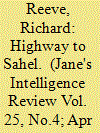

|
|
|
| 13 |
ID:
156032
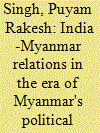

|
|
|
| 14 |
ID:
032468


|
|
|
|
|
| Publication |
London, macmillan Press, 1971.
|
| Description |
142p.Hbk
|
| Standard Number |
333122429
|
|
|
|
|
|
|
|
|
|
|
|
Copies: C:1/I:0,R:0,Q:0
Circulation
| Accession# | Call# | Current Location | Status | Policy | Location |
| 009611 | 945.092/WIS 009611 | Main | On Shelf | General | |
|
|
|
|
| 15 |
ID:
029681
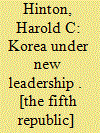

|
|
|
|
|
| Publication |
New York, Praeger Publishers, 1983.
|
| Description |
xi, 282p.pbk
|
| Standard Number |
0030632938
|
|
|
|
|
|
|
|
|
|
|
|
Copies: C:1/I:0,R:0,Q:0
Circulation
| Accession# | Call# | Current Location | Status | Policy | Location |
| 023205 | 951.9043/HIN 023205 | Main | On Shelf | General | |
|
|
|
|
| 16 |
ID:
133123
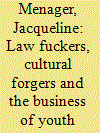

|
|
|
|
|
| Publication |
2014.
|
| Summary/Abstract |
Myanmar's rolling political and economic transition is being shaped by profound generational change. Little attention has been paid to the priorities and politics of the new generation of youth. This article seeks to explore the construction of Myanmar's elites as a homogenized, unitary, uncontested group through a close examination of elite youth. The article challenges some basic preconceptions about Myanmar's elites. Three primary youth cohorts are appraised and situated in the transition: the entitled business elite, the cultural forgers and the resistant forces. All three groups are privileged in Myanmar society, where their power struggles see efforts to assert degrees of cultural supremacy. Drawing on ethnographic research in Myanmar, the article offers insights into the role of elite youth in Myanmar's future and their perceptions of the present shift of national political and economic policies.
|
|
|
|
|
|
|
|
|
|
|
|
|
|
|
|
| 17 |
ID:
124599
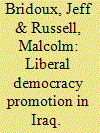

|
|
|
|
|
| Publication |
2013.
|
| Summary/Abstract |
is article asks whether there are lessons that can be drawn from the democratization of Iraq for the possible democratization of the Middle East and North Africa (MENA) in the wake of the 2010-2011 Arab uprisings. The paper draws on the democratization program in Iraq in 2003 and 2004 to demonstrate that focusing on the promotion of a liberal democratic model in Iraq translated into a lack of operational flexibility, which let democracy assistance unable to cope with socio-economic demands, local realities and reactions to democratization. Taking into account a variation in the intensity of interventionism between Iraq and MENA, the article argues that there is sufficient similarities between both cases to point Western democracy promoters in the direction of models of democracy that offer a more comprehensive response to the current political transition in Egypt, Tunisia and Libya than the traditional focus on the promotion of liberal democracy does.
|
|
|
|
|
|
|
|
|
|
|
|
|
|
|
|
| 18 |
ID:
108527
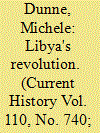

|
|
|
| 19 |
ID:
129222
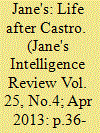

|
|
|
| 20 |
ID:
133546
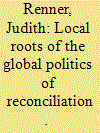

|
|
|
|
|
| Publication |
2014.
|
| Summary/Abstract |
Fostering 'national reconciliation' through public truth-telling processes has become a central objective of post-conflict peacebuilding. This article critically reflects on the global politics of reconciliation by illuminating its process of emergence in the South African transition to democracy. The South African Truth and Reconciliation Commission (TRC) is commonly seen as an authoritative template for reconciliation processes around the globe, and the South African reconciliation experience often serves as a legitimising myth for the global reconciliation project. In this article, I question the intrinsic moral value of reconciliation in general as well as its interpretation in terms of public truth-telling. Drawing on the discourse theory developed by Ernesto Laclau and Chantal Mouffe, I argue that the term 'reconciliation' emerged in South Africa as an empty universal, a vague yet powerful social ideal, that could be embraced by the antagonistic parties of the ANC and NP not because of any intrinsic value, but rather because of its vagueness and semantic flexibility. The particular interpretation of reconciliation in terms of truth-telling was then articulated through the political demands raised by different societal groups, which constructed a reconciliation discourse that produced and naturalised truth-telling and healing as central components of a reconciliation policy. This discourse was eventually stabilised and institutionalised by the workings of the TRC.
|
|
|
|
|
|
|
|
|
|
|
|
|
|
|
|
|
|
|
|
|